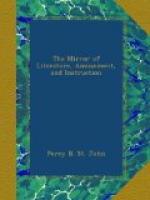Why, that of course.
A quarter of a farthing each square foot—
No meat, remember! Not an inch of meat,
Nor drink, nor dram. You’re not to trust to these.
Wilt stand that bargain, Gabriel?”—“I accept.”
He struck it, quite o’erjoy’d. We sought the clerk,
Sign’d—seal’d. He drew his purse. The clerk went on
Figuring and figuring. “What a fuss you make!
’Tis plain,” said he, “the sum is eighteen-pence”—
“’Tis somewhat more, sir,” said the civil clerk—
And held out the account. “Two hundred round,
And gallant payment over.” The Miser’s face
Assumed the cast of death’s worst lineaments.
His skinny jaws fell down upon his breast;
He tried to speak, but his dried tongue refused
Its utterance, and cluck’d upon the gum.
His heart-pipes whistled with a crannell’d sound;
His knell-knees plaited, and his every bone
Seem’d out of joint. He raved—he cursed—he wept—
But payment he refused. I have my bond,
Not yet a fortnight old, and shall be paid.
It broke the Miser’s heart. He ate no more,
Nor drank, nor spake, but groan’d until he died;
This grave kill’d him, and now yearns for his bones.
But worse than all. ’Tis twenty years and more
Since he brought home his coffin. On that chest
His eye turn’d ever and anon. It minded him,
He said, of death. And as be sat by night
Beside his beamless hearth, with blanket round
His shivering frame, if burst of winter wind
Made the door jangle, or the chimney moan,
Or crannied window whistle, he would start,
And turn his meagre looks upon that chest;
Then sit upon’t, and watch till break of day.
Old wives thought him religious—a good man!
A great repentant sinner, who would leave
His countless riches to sustain the poor.
But mark the issue. Yesterday, at noon,
Two men could scarcely move that ponderous chest
To the bedside to lay the body in.
They broke it sundry, and they found it framed
With double bottom! All his worshipp’d gold
Hoarded between the boards! O such a worm
Sure never writhed beneath the dunghill’s base!
Fifteen feet under ground! and all his store
Snug in beneath him. Such a heaven was his.
Now, honest Teddy, think of such a wretch,
And learn to shun his vices, one and all.
Though richer than a Jew, he was more poor
Than is the meanest beggar. At the cost
Of other men a glutton. At his own,
A starveling. A mere scrub. And such a coward,
A cozener and liar—but a coward,
And would have been a thief—But was a coward.
A quarter of a farthing each square foot—
No meat, remember! Not an inch of meat,
Nor drink, nor dram. You’re not to trust to these.
Wilt stand that bargain, Gabriel?”—“I accept.”
He struck it, quite o’erjoy’d. We sought the clerk,
Sign’d—seal’d. He drew his purse. The clerk went on
Figuring and figuring. “What a fuss you make!
’Tis plain,” said he, “the sum is eighteen-pence”—
“’Tis somewhat more, sir,” said the civil clerk—
And held out the account. “Two hundred round,
And gallant payment over.” The Miser’s face
Assumed the cast of death’s worst lineaments.
His skinny jaws fell down upon his breast;
He tried to speak, but his dried tongue refused
Its utterance, and cluck’d upon the gum.
His heart-pipes whistled with a crannell’d sound;
His knell-knees plaited, and his every bone
Seem’d out of joint. He raved—he cursed—he wept—
But payment he refused. I have my bond,
Not yet a fortnight old, and shall be paid.
It broke the Miser’s heart. He ate no more,
Nor drank, nor spake, but groan’d until he died;
This grave kill’d him, and now yearns for his bones.
But worse than all. ’Tis twenty years and more
Since he brought home his coffin. On that chest
His eye turn’d ever and anon. It minded him,
He said, of death. And as be sat by night
Beside his beamless hearth, with blanket round
His shivering frame, if burst of winter wind
Made the door jangle, or the chimney moan,
Or crannied window whistle, he would start,
And turn his meagre looks upon that chest;
Then sit upon’t, and watch till break of day.
Old wives thought him religious—a good man!
A great repentant sinner, who would leave
His countless riches to sustain the poor.
But mark the issue. Yesterday, at noon,
Two men could scarcely move that ponderous chest
To the bedside to lay the body in.
They broke it sundry, and they found it framed
With double bottom! All his worshipp’d gold
Hoarded between the boards! O such a worm
Sure never writhed beneath the dunghill’s base!
Fifteen feet under ground! and all his store
Snug in beneath him. Such a heaven was his.
Now, honest Teddy, think of such a wretch,
And learn to shun his vices, one and all.
Though richer than a Jew, he was more poor
Than is the meanest beggar. At the cost
Of other men a glutton. At his own,
A starveling. A mere scrub. And such a coward,
A cozener and liar—but a coward,
And would have been a thief—But was a coward.
Blackwood’s Magazine.
* * * * *
THE SELECTOR; AND LITERARY NOTICES OF NEW WORKS.
PARIS AND ITS HISTORICAL SCENES.




